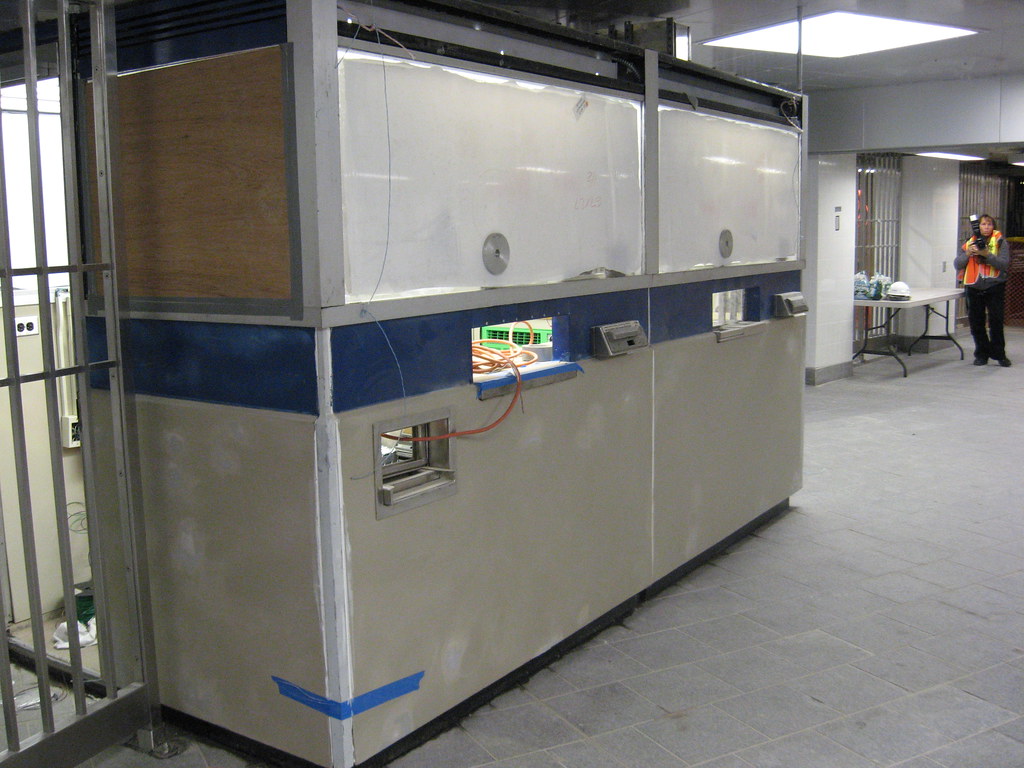 Later this evening, MTA Board members and angry union members will square off in a pair of public hearings. Despite voting to cut the station agents in early 2010 and holding hearings on a nearly identical proposal a year ago, the MTA had to host these public open houses to placate a Manhattan Supreme Court judge who found that the MTA’s dismissals this year for plans approved last year violated the law. What the hearings tonight will accomplish is very little.
Later this evening, MTA Board members and angry union members will square off in a pair of public hearings. Despite voting to cut the station agents in early 2010 and holding hearings on a nearly identical proposal a year ago, the MTA had to host these public open houses to placate a Manhattan Supreme Court judge who found that the MTA’s dismissals this year for plans approved last year violated the law. What the hearings tonight will accomplish is very little.
We’ve been down this path before with public hearings, and every time the MTA opens itself up to hearing from its constituents, politicians and interest groups grab the microphones. Instead of allowing people to speak in the order in which they’ve signed up, our elected officials often jump to the front of the line to get in their shots and go home. That’s what happened in March when the authority heard from the public on the planned slate of service cuts.
This week’s hearings should be even worse. The TWU organizers have engaged in a blitz via Twitter, Facebook, phone-banking and old fashioned union round-ups to, as one release put it, “pack these hearings and deliver a strong message” to the MTA Board members. At locations in Manhattan and Queens, Brooklyn and the Bronx, MTA employees will come out in force to yell at those who sign their checks.
In all likelihood, tempers will flare as they did in March. When job cuts are on the line, labor leaders tend to be ruthless, and anyone who dares speak out in favor of the plan to shutter token booths and fire station agents will be, at the very least, mocked and probably threatened by the union supporters in the crowd. With jobs on the line, after all, the TWU members are very motivated to attend these hearings and make themselves known.
On the one hand, I can’t hold the TWU’s actions against them. As a labor union, those in charge have to protect their jobs, and right now, the TWU is fighting against an MTA Board that has already made up its mind in a day and age very hostile to labor interests. Many New Yorkers have come to see station agents as superfluous, and while these workers put themselves in harm’s way on a daily basis, the media coverage often focuses around those who don’t do their jobs well rather than those who do.
But on the other hand, I still have to wonder about the union’s lackluster support for the MTA in Albany and at home. Instead of talking about the way pension obligations represent nine percent of the MTA’s annual expenditures, former union members focus on debt service which accounts for 16 percent of the MTA’s spending pie. Do two spending wrongs make an economic right?
The TWU has never embraced congestion pricing, claiming to me once via Twitter that it was “too complicated” to get into the debate through that media and voicing concerns about the impact a charge would have on the middle class. This argument completely ignores the fact that middle class New Yorkers don’t spend their days driving to and from Manhattan’s Central Business District and would, in fact, benefit more from a more fully funded subway system. Such are the way of unions today.
So tonight we get a political governmental farce. On the stage will be MTA Board members who are there because a judge told them to be. They’ll hear the crowd; they’ll vote to close the booths and fire the station agents. At the microphone, we’ll see an increasingly belligerent audience using the time to bash the MTA for all of its many short-comings. No matter who wins, those paying the fare and riding the subways will lose.

 With TWU workers set to enjoy a three-percent raise next year despite a $400 million MTA budget gap that led to this week’s service cuts, Albany is set to handcuff the MTA’s labor practices. A bill that passed the Senate yesterday and now awaits Assembly approval will bar the authority from closing station booths, fire agents and eliminating on-board personnel numbers. It would, says, the MTA rollback $80 million in cost savings, and the hypocrisy from Albany on this measure runs deep.
With TWU workers set to enjoy a three-percent raise next year despite a $400 million MTA budget gap that led to this week’s service cuts, Albany is set to handcuff the MTA’s labor practices. A bill that passed the Senate yesterday and now awaits Assembly approval will bar the authority from closing station booths, fire agents and eliminating on-board personnel numbers. It would, says, the MTA rollback $80 million in cost savings, and the hypocrisy from Albany on this measure runs deep.